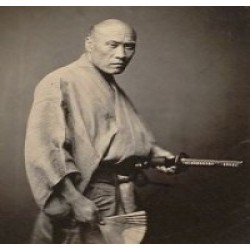
Yamamoto Tsunetomo
| Date of Birth | : | 11 Jun, 1659 |
| Date of Death | : | 30 Nov, 1719 |
| Place of Birth | : | Saga Domain |
| Profession | : | Samurai, Philosopher, Writer |
| Nationality | : | Japanese |
Yamamoto Tsunetomo Buddhist monastic name Yamamoto Jōchō was a samurai of the Saga Domain in Hizen Province under his lord Nabeshima Mitsushige. He became a Zen Buddhist priest and relayed his experiences, memories, lessons, ideas, and aphorisms to the samurai Tashiro Tsuramoto, who compiled them under the title Hagakure.
Early life and education
Yamamoto Tsunetomo was born 11 June 1659 to Yamamoto Jin'emon, then aged 71, and a woman whose maiden name was Maeda. He was the last born to the family, and regarded by his father as a superfluous addition who was intended to be given away to a salt merchant. For most of his childhood, Tsunetomo was sickly and claimed doctors told him he would not live past twenty years old. Despite his fragile health, he was employed at age 9 to be a page for Nabeshima Mitsuhige. Tsunetomo's skills in literature led Mitsuhige to have him study under noted man of letters Kuranaga Rihei. In his twenties, Tsunetomo studied under the Zen Buddhist priest Tannen and the Confucian scholar Ishida Ittei, both of whom greatly influenced his philosophy. The last major influence in Tsunetomo's education was his nephew Yamamoto Gorōzaemon, who was older than Tsunetomo and helped him get a position as a scribe in Edo and then in the imperial capital Kyoto in 1686. In 1687, Gorōzaemon took responsibility for a large destructive fire, leading to him and Tsunetomo both resigning from their positions. Tsunetomo returned to work for Mitsuhige.
Buddhist priesthood
In 1695, Mitsushige retired due to ill health, and tasked Tsunetomo with finding a copy of a book of secret poetry instructions called Kokindenju. Tsunetomo obtained a copy in Kyoto and on 1 May 1700, presented it to Mitsuhige, who died two weeks later.Tsunetomo intended to commit suicide to follow his master in death, but both Mitsushige and the shogunate as a whole had banned the practice. Instead of continuing as a samurai seeking minor positions, Tsunetomo became a Buddhist priest and his wife became a nun, living in a hermitage in the mountains.
Quotes
Light matters should be dealt with seriously. Serious matters should be dealt with lightly.
There is surely nothing other than the single purpose of the present moment. A man's whole life is a succession of moment after moment. There will be nothing else to do, and nothing else to pursue. Live being true to the single purpose of the moment.
If you are slain in battle, you should be resolved to have your corpse facing the enemy.
I have found that the Way of the samurai is death. This means that when you are compelled to choose between life and death, you must quickly choose death.
It is a principle of the art of war that one should simply lay down his life and strike. If one's opponent also does the same, it is a even match. Defeating one's opponent is then a matter of faith and destiny.
There is nothing we should be quite so grateful for as the last line of the poem that goes, 'When your own heart asks.
A real man does not think of victory or defeat. He plunges recklessly towards an irrational death.
In China there was once a man who liked pictures of dragons, and his clothing and furnishings were all designed accordingly. His deep affection for dragons was brought to the attention of the dragon god, and onde day a real dragon appeared before his window. It is said that he died of fright. He was probably a man who always spoke big words but acted differently when facing the real thing.
The deepest love is often hidden.
It is a wretched thing that the young men of today are so contriving and so proud of their material posessions. Men with contriving hearts are lacking in duty. Lacking in duty, they will have no self-respect.
